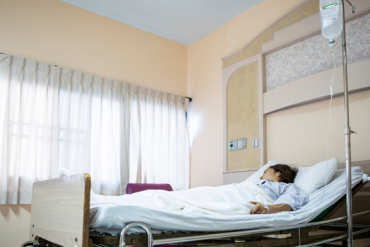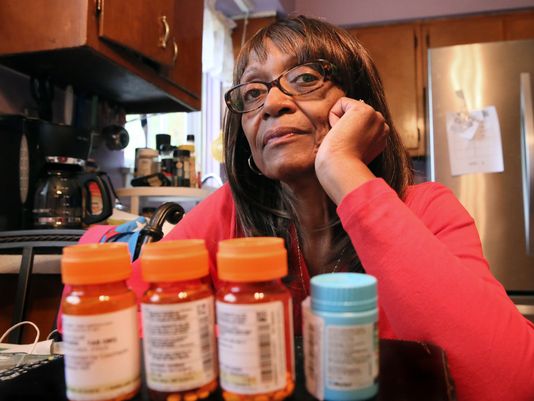Category: Medicare costs
Decline of Medicare subsidized drug plans leaves seniors with less choice
By Susan Jaffe, Kaiser Health News | November 21, 2015 | and also published in 
Even though health problems forced Denise Scott to retire several years ago, she feels “very blessed” because her medicine is still relatively inexpensive and a subsidy for low-income Medicare beneficiaries covers the full cost of her monthly drug plan premiums. But the subsidy is not going to stretch as far next year.
That’s because the premium for Scott’s current plan will cost more than her federal subsidy. The 64-year-old from Cleveland is among the 2 million older or disabled Americans who will have to find new coverage that accepts the subsidy as full premium payment or else pay for the shortfall. As beneficiaries explore options during the current Medicare enrollment period, there are only 227 such plans from which they can choose next year, 20% fewer than this year, and the lowest number since the drug benefit was added to Medicare in 2006, according to the Centers for Medicare & Medicaid Services. [Continued in USA Today, Kaiser Health News and PBS NewsHour]
…USA grapples with high drugs costs
 Volume 386, Number 10009
Volume 386, Number 10009
28 November 2015
WORLD REPORT More Americans are getting health insurance, including coverage for prescription drugs, but high prices may make them inaccessible. Susan Jaffe, The Lancet’s Washington correspondent, reports.
Patients in the USA pay more for prescription drugs than almost anywhere else in the world, forcing as many as one in four who can’t afford the high prices to go without their medicine last year, according to a Kaiser Family Foundation survey. So even though more Americans have health insurance, the new therapies and cures that can prevent more expensive health complications might be out of reach.
After several well-publicised, huge spikes in drug prices—including Turing Pharmaceutical’s increase for pyrimethamine (marketed as Daraprim) from US$13·50 to $750 a pill—the problem is drawing unprecedented attention from nearly every quarter: the Obama Administration, Congress, state officials, health insurance companies, drug makers, as well as the physicians and their patients who have clamoured for help for years. It also surfaced during this month’s Democratic presidential debate.
Heather Block, a patient advocate from Delaware who spoke at a day-long pharmaceutical forum hosted by the US Department of Health and Human Services (HHS) earlier this month, pays $9800 a month for the drugs she takes to treat breast cancer that has spread to her liver and lungs. Although she has Medicare coverage, she is still responsible for a share of her medical expenses. “Innovation is meaningless if nobody can afford it”, she said. “I still face financial insecurity and eventually bankruptcy—if I live that long.” [Continued here ]
…Can you hear me now?
The President’s science advisors say innovative technology can provide low-cost alternatives to pricey hearing aids.
Susan Jaffe | Washington Correspondent for The Lancet | 11th November 2015
Almost  30 million Americans over 60 years old have difficulty hearing, but less than a third can afford hearing aids, according to a report to President Barack Obama by his Council of Advisors on Science and Technology two weeks ago. Even though hearing loss is often part of the natural aging process, the council did not recommend that Medicare, pay for hearing aids, which can cost an average of $5,000 to $6,000 for a pair. [Continued here]
30 million Americans over 60 years old have difficulty hearing, but less than a third can afford hearing aids, according to a report to President Barack Obama by his Council of Advisors on Science and Technology two weeks ago. Even though hearing loss is often part of the natural aging process, the council did not recommend that Medicare, pay for hearing aids, which can cost an average of $5,000 to $6,000 for a pair. [Continued here]
… Don’t Just Renew Your Medicare Plan. Shopping Around Can Save Money.
By Susan Jaffe | October 15, 2015 | Kaiser Health News in collaboration with Money magazine
Ten years after a prescription drug benefit was added to Medicare, 39 million older or disabled Amer icans have coverage to help pay for their medicine, including most of the 17 million with private insurance policies known as Medicare Advantage, an alternative to traditional Medicare.
icans have coverage to help pay for their medicine, including most of the 17 million with private insurance policies known as Medicare Advantage, an alternative to traditional Medicare.
The annual enrollment period for these private drug and Advantage plans for 2016 starts Thursday and runs through Dec. 7.
period for these private drug and Advantage plans for 2016 starts Thursday and runs through Dec. 7.
It pays to shop around. The monthly cost is increasing an average 26 percent for UnitedHealthcare’s AARP MedicareRx Saver Plus while the First Health Value Plus plan
is dropping an average 13 percent, according to an analysis of the 10 most popular drug plans by Avalere Health, a research firm.
Some actual costs may be even more dramatic. In Albany, N.Y., the price of a Cigna-HealthSpring drug plan is going up 36 percent, according to the StateWide Senior Action Council, a New York consumer group. [More in Kaiser Health News or Money magazine]
…Medicare Advantage Plans Need Tougher Oversight, GAO Says
| Connecticut Health Investigative Team Writer | October 5, 2015
Federal investigators have found that Medicare officials rarely enforce rules for private insurance plans intended to make sure beneficiaries will be able to see a doctor when they need care.
It’s a problem many Connecticut seniors know too well. In 2013, UnitedHealthcare, the nation’s largest health insurance company, dropped hundreds of health care providers from its  Connecticut Medicare Advantage plan, including 1,200 doctors at the Yale Medical Group and Yale-New Haven Hospital. Medicare Advantage beneficiaries scrambled to find new insurance or new doctors while the Fairfield and Hartford counties medical associations went to court to try to stop the terminations.
Connecticut Medicare Advantage plan, including 1,200 doctors at the Yale Medical Group and Yale-New Haven Hospital. Medicare Advantage beneficiaries scrambled to find new insurance or new doctors while the Fairfield and Hartford counties medical associations went to court to try to stop the terminations.
The report by the Government Accountability Office, the investigative arm of Congress, said that Medicare did not check provider networks to ensure that doctors were available to beneficiaries and cited Connecticut as a “case study” in what can go wrong.
The GAO report shows that Medicare “was not verifying network adequacy. That’s their job and they abdicated that responsibility,” said U.S. Rep. Rosa DeLauro, D-New Haven, who requested the investigation along with other members of the Connecticut congressional delegation. MORE
…Congress Overwhelmingly Approves Bill Bolstering Medicare Patients’ Hospital Rights
By Susan Jaffe | Kaiser Health News | July 29, 2015 | This KHN story also ran in 
The U.S. Senate unanimously approved legislation Monday night requiring hospitals across the nation to tell Medicare patients when they receive observation care but have not been admitted to the hospital. It’s a distinction that’s easy to miss until patients are hit with big medical bills after a short stay.
miss until patients are hit with big medical bills after a short stay.
The vote follows overwhelming approval in the U. S. House of Representatives in March. The legislation is expected to be signed into law by President Barack Obama, said its House sponsor, Texas Democratic Rep. Lloyd Doggett.
It’s called the NOTICE Act, short for “Notice of Observation Treatment and Implication for Care Eligibility.” The law would require hospitals to provide written notification to patients 24 hours after receiving observation care, explaining that they have not been admitted to the hospital, the reasons why, and the potential financial implications.
Those implications can be dire. Observation care hurts seniors in two ways: It keeps Medicare’s more comprehensive hospitalization coverage from kicking in, and it means they may not get Medicare’s limited nursing home benefit if they need care in a facility after being in a hospital.
To qualify for Medicare’s nursing home coverage, beneficiaries must first spend three consecutive midnights as an admitted patient in a hospital, and observation days don’t count. Without that coverage, seniors could pay thousands of dollars for the nursing home care their doctor ordered, or else try to recover on their own. Observation care is a classification used when patients are not well enough to go home but not sick enough to be admitted. [Continued in Kaiser Health News]…
New Regulations Would Require Modernizing Nursing Home Care
By Susan Jaffe | July 13, 2015 | Kaiser Health News in collaboration with ![]()
After nearly 30 years, the Obama administration wants to modernize the rules nursing homes must follow to qualify for Medicare and Medicaid payments.
The hundreds of pages of proposed changes cover everything from meal times to use of  antipsychotic drugs to staffing. Some are required by the Affordable Care Act and other recent federal laws, as well as the president’s executive order directing agencies to simplify regulations and minimize the costs of compliance.
antipsychotic drugs to staffing. Some are required by the Affordable Care Act and other recent federal laws, as well as the president’s executive order directing agencies to simplify regulations and minimize the costs of compliance.
“Today’s measures set high standards for quality and safety in nursing homes and long-term care facilities,” said Health and Human Services Secretary Sylvia M. Burwell. “When a family makes the decision for a loved one to be placed in a nursing home or long-term care facility, they need to know that their loved one’s health and safety are priorities.”
in a nursing home or long-term care facility, they need to know that their loved one’s health and safety are priorities.”
Officials announced the update as the White House Conference on Aging convenes Monday. The once-a-decade conclave sets the agenda for meeting the diverse needs of older Americans, including long-term care options. This month also marks the 50th anniversary of the Medicare and Medicaid programs, which cover almost 125 million older, disabled or low-income Americans. Medicare and Medicaid beneficiaries make up the majority of residents in the country’s more than 15,000 long-term care facilities. [MORE from Kaiser Health News and NPR]…
Want a good laugh? Head to the hospital.
By Susan Jaffe KAISER HEALTH NEWS | July 7, 2015 | This KHN story also ran in 
Every month, a group of older adults goes to Washington’s Sibley Memorial Hospital, but they don’t see a doctor or get tests. They’re not sick. They come just for laughs.

Joanne Philleo, 79, enjoys a joke at the monthly “Laugh Cafe” event at Sibley Memorial Hospital. (Amanda Voisard for The Washington Post)
They gather in a room next to the hospital cafeteria for the “Laugh Cafe,” one of the activities offered to local seniors, including the 7,300 members of Sibley’s Senior Association. The price of admission is one joke, recited out loud. Experts say laughing can be good for your health, and everyone in the room strongly agrees.
…The association for those age 50 or older also offers other activities, including French and Italian conversation classes, day trips to museums, a current events group, and — the latest addition — tango lessons. In addition, members receive discounts on hospital parking and at the gift shop, pharmacy and restaurant. In all, more than 10,000 seniors participate.
Sibley is one of several hospitals in the Washington area — along with others across the country — offering social activities and other benefits to help seniors stay healthy and out of the hospital, while encouraging them to visit. Participants do not need to have been patients.
But some experts are concerned that the activities are less about health than about marketing to Medicare beneficiaries, especially those who can go to the hospital of their choice when they need care because they are not enrolled in private insurance plans with limited provider networks.[Continued in Washington Post]…
When Turning 65, Consumers With Marketplace Plans Need To Be Vigilant In Choosing Health Coverage
By Susan Jaffe | June 25, 2015 | Kaiser Health News
Befor e the Affordable Care Act, older adults who couldn’t afford to buy their own health insurance would count the days until their 65th birthday, when Medicare would kick in. Now, 10,000 Americans hit that milestone every day, but for some who have coverage through the ACA’s insurance marketplaces, Medicare may not be the obvious next step.
e the Affordable Care Act, older adults who couldn’t afford to buy their own health insurance would count the days until their 65th birthday, when Medicare would kick in. Now, 10,000 Americans hit that milestone every day, but for some who have coverage through the ACA’s insurance marketplaces, Medicare may not be the obvious next step.
“Consumers eligible for Medicare can keep or renew their marketplace plan,” said Medicare spokesman Alper Ozinal, as long as they don’t also join Medicare. [Continued in Kaiser Health News]…
Officials Weigh Options To Hold Down Medicare Costs For Hospice
By Susan Jaffe | April 23, 2015 | Kaiser Health News and also published in 
Medicare officials are considering changes in the hospice benefit to stop the federal government from paying twice for care given to dying patients. But patient advocates and hospice providers fear a new policy could make the often difficult decision to move into hospice care even tougher.
Patients are eligible for hospice care when doctors determine they have no more than six months to live. They agree to forgo curative treatment for their terminal illness and instead receive palliative or comfort care. However, they are also still allowed Medicare coverage for health problems not related to their terminal illness, including chronic health conditions or for accidental injuries.
Medicare pays a set amount to the hospice provider for all treatment and services related to the terminal illness, including doctor’s visits, nursing home stays, hospitalization, medical equipment and drugs. If a patient needs treatment that hospice doesn’t provide because it is not related to the terminal illness — or the patient seeks care outside of hospice — Medicare pays the non-hospice providers. The problem is that sometimes Medicare pays for care outside the hospice benefit that it already paid hospice to cover.
To reduce the chances of these duplicative payments, Medicare officials have announced that they are examining whether to assume “virtually all” the care hospice patients receive should be covered under the hospice benefit….
Seniors’ advocates are worried that putting all coverage under the hospice benefit will create obstacles for patients. Instead, Medicare should go after hospice providers who are shifting costs to other providers that Medicare expects hospice to cover, said Terry Berthelot, a senior attorney at the Center for Medicare Advocacy, who urged the government to protect hospice patients’ access to non-hospice care….”If your blood sugar gets out of control, that could hasten your death,” she said. “But people shouldn’t be rushed off to die because they’ve elected the hospice benefit.” [More from KHN] [More in USA Today]
…Aging In Rural America
For older Americans, accessing high-quality care can be a challenge. For those in rural communities, it’s even harder.
By SUSAN JAFFE Health Affairs January 2015 Volume 34, Number 1

Care in rural America: Dr. Robert Wergin goes over medications with Sharon Stutzman at the Milford Family Medical Center in rural Nebraska.
In the southeastern Nebraska town of  Milford, population 2,100, Dr. Robert Wergin understands it’s not easy for some of his older patients to get to his office. Some may live on isolated farmsteads several miles out of town, and if they don’t drive, their son or daughter—if nearby—may have to take time off from work to bring them to their appointments because there’s no public transportation. Massive snowstorms are nothing special but still cause a wave of cancellations.
Milford, population 2,100, Dr. Robert Wergin understands it’s not easy for some of his older patients to get to his office. Some may live on isolated farmsteads several miles out of town, and if they don’t drive, their son or daughter—if nearby—may have to take time off from work to bring them to their appointments because there’s no public transportation. Massive snowstorms are nothing special but still cause a wave of cancellations.
In addition to these challenges, rural America’s elderly tend to be poorer, have higher levels of chronic disease, and have a dwindling supply of health care providers, compared to their peers in urban communities, explains Brad Gibbens, deputy director of the University of North Dakota’s Center for Rural Health, in Grand Forks. And their support system is shrinking, as more young adults seeking job opportunities head out to urban areas. “The elderly [rural] population tends to stay put because that’s where they’ve lived all their lives, and there isn’t really an economic beacon that’s pulling them to another area,” he says. [Continued in Health Affairs, and PDF here]…
Disabled Vt. Senior Wins Medicare Coverage After 2nd Lawsuit
By Susan Jaffe | Kaiser Health News in collaboration with National Public Radio | October 30, 2014
 A disabled senior with serious health problems who successfully challenged Medicare for denying her home health care coverage has racked up another win against the government.
A disabled senior with serious health problems who successfully challenged Medicare for denying her home health care coverage has racked up another win against the government.
In her latest federal lawsuit filed in June, Glenda Jimmo, 78, argued Medicare should have paid for the nursing care and other skilled services she received at her home during 2007. On Wednesday, Medicare officials agreed, invalidating an April ruling that she was not entitled to coverage because her condition had stabilized and she was not improving. “I won,” said Jimmo, who is receiving rehab therapy at a Vermont nursing home and hopes to return home soon.  “I’m very pleased. It makes me feel America is still in good shape.”
“I’m very pleased. It makes me feel America is still in good shape.”
The settlement doesn’t mention that Jimmo was the lead plaintiff in a 2011 class-action lawsuit seeking to eliminate the so-called “improvement standard” as a criteria for Medicare coverage. In the 2012 settlement that bears her name, the government agreed that improvement was not required and allowed many Medicare beneficiaries with chronic conditions and disabilities to appeal claims that had been denied because they were unlikely to get better. [MORE from Kaiser Health News and NPR] …
Medicare Testing Payment Options That Could End Observation Care Penalties
By Susan Jaffe KAISER HEALTH NEWS | July 22, 2014 | This KHN story also ran in ![]()
Medicare officials have allowed patients at dozens of hospitals participating in pilot projects across the country to be exempted from the controversial requirement that limits nursing home coverage to seniors admitted to a hospital for at least three days.
The idea behind these experiments is to find out whether new payment arrangements with the hospitals and other health care providers that drop the three-day rule can reduce costs or keep them the same while improving the quality of care. They are conducted under a provision of the Affordable Care Act that created the Center for Medicare and Medicaid Innovations to develop ways of improving Medicare.
If the experiment saves Medicare money and improves care, “we should be able to make an argument to Medicare that there is a way to do it for all our patients,” said Dr. Eric Weil, clinical affairs associate chief for the general internal medicine division at Massachusetts General Hospital in Boston. The hospital is one of five in the Partners Health System that began offering the waiver in April, after testing a limited version.
“It gets patients to the care they need much quicker and prevents them from clinically declining at home,” said Weil. If patients can spend less time in the hospital, he said that frees up valuable resources for sicker patients. And it saves money for Medicare because nursing home care or home health care is cheaper than a hospital stay. [Continued in KHN] [Continued in Washington Post]…
Medicare Seeks To Stop Overpayments For Hospice Patients’ Drugs
By Susan Jaffe May 1,2014 KAISER HEALTH NEWS in collaboration with ![]()
New Medicare guidance taking effect today aims to stop the federal government from paying millions of dollars to hospice organizations and drug insurance plans for the same prescriptions for seniors. But the changes may make it more difficult for dying patients to get some medications, senior advocates and hospice providers say.
The new measures direct insurers not to pay for any prescriptions for hospice patients until they receive confirmation that the drugs are not covered instead by the hospice provider. Requiring additional authorization for these prescriptions will “prevent duplicate payments for drugs covered under the hospice benefit,” Medicare officials told hospice providers and insurers in a conference call three weeks ago. [More from KHN] [More from Washington Post]…
A Quiet ‘Sea Change’ in Medicare
By Susan Jaffe | March 25, 2014, 5:00 am ![]()
Ever since Cindy Hasz opened her geriatric care management business in San Diego 13 years ago, she has been fighting a losing battle for clients unable to get Medicare coverage for physical therapy because they “plateaued” and were not were not getting better.
 “It has been standard operating procedure that patients will be discontinued from therapy services because they are not improving,” she said.
“It has been standard operating procedure that patients will be discontinued from therapy services because they are not improving,” she said.

Glenda Jimmo at home in Lincoln, Vt., in 2012. (Paul O. Boisvert for The New York Times)
No more. In January, Medicare officials updated the agency’s policy manual — the rule book for everything Medicare does — to erase any notion that improvement is necessary to receive coverage for skilled care. That means Medicare now will pay for physical therapy, nursing care and other services for beneficiaries with chronic diseases like multiple sclerosis, Parkinson’s or Alzheimer’s disease in order to maintain their condition and prevent deterioration.
But don’t look for an announcement about the changes in the mail, or even a prominent notice on the Medicare website. Medicare officials were required to inform health care providers, bill processors, auditors, Medicare Advantage plans, the 800-MEDICARE information line and appeals judges — but not beneficiaries. MORE…
Draft Rules Would Help Protect Seniors When Medicare Advantage Plans Drop Doctors
By Susan Jaffe March 24, 2014 KAISER HEALTH NEWS in collaboration with ![]()
Federal officials are considering new Medicare Advantage rules to help protect seniors when insurers make significant reductions to their networks of doctors and other health care providers. The proposals follow UnitedHealthcare’s decision to drop thousands of doctors from its Medicare Advantage plans in at least 10 states last fall.
The government’s response is part of the 148-page announcement of proposed rules and payment rates for next year’s Medicare Advantage plans released last month by the U.S. Centers for Medicare & Medicaid Services. Officials say that the terminations only a few weeks before Medicare’s Dec. 7 enrollment deadline may not have given seniors enough time to find new doctors, choose a different plan or rejoin traditional Medicare, which does not restrict beneficiaries to a limited network of providers.
…Although the announcement does not name any insurance companies, officials prefaced the proposals by writing, “Recent significant mid-year changes to MAOs’ [Medicare Advantage organizations’] provider networks have prompted CMS to reexamine its current guidance on these requirements and to consider augmenting such guidance in response to such changes.” [More from KHN] [More from Washington Post]…
Can Congress Put An End To Annual Medicare Payment Ritual?
By Susan Jaffe | National Public Radio | March 14, 2014, 3:26 pm 
Congress is still searching for money to avoid a 24 percent cut in pay for doctors who treat Medicare patients. But seniors are already paying their share of the cost in premiums, as if the pay cut — scheduled to kick in on April 1 — won’t happen. MORE…
As HHS Moves To End Overload Of Medicare Claims Appeals, Beneficiaries Will Get Top Priority
By Susan Jaffe Jan. 21, 2014 KAISER HEALTH NEWS in collaboration with![]()
Medicare beneficiaries who have been waiting months and even years for a hearing on their appeals for coverage may soon get a break as their cases take top priority in an effort to remedy a massive backlog.
Nancy Griswold, the chief judge of the Office of Medicare Hearings and Appeals (OMHA), announced in a memo sent last month to more than 900 appellants and health care associations that her office has a backlog of nearly 357,000 claims. In response, she said the agency has suspended acting on new requests for hearings filed by hospitals, doctors, nursing homes and other health care providers, which make up nearly 90 percent of the cases. But beneficiaries’ appeals will continue to be processed.
“We have elderly or disabled Medicare clients waiting as long as two years for a hearing and nine months for a decision,” said Judith Stein, executive director of the Center for Medicare Advocacy. [More from KHN] [More from Washington Post]…
Link
By Susan Jaffe | October 15, 2013 | Kaiser Health News produced in collaboration with 
The seven-week enrollment period for next year’s Medicare prescription drug and managed-care plans begins Tuesday, but seniors shouldn’t simply renew their policies and assume the current coverage will stay the same. There’s a likely payoff for those who pay close attention to the details.[More in KHN] [More in USA Today]
Seniors Cautioned To Pay Close Attention To Details As Enrollment Begins In Medicare Plans
FAQ: Medicare Beneficiaries May See Increased Access To Physical Therapy Or Some Other Services
By Susan Jaffe | June 25, 2013 | Kaiser Health News in collaboration with
For years, seniors in Medicare have been told that if they don’t improve when getting physical therapy or other skilled care, that care won’t be paid for. No progress, no Medicare coverage — unless the problem got worse, in which case the treatment could resume.
This frustrating Catch-22 spurred a class-action lawsuit against Health and Hu man Services Secretary Kathleen Sebelius. In January, a federal judge approved a settlement in which the government agreed that this “improvement standard” is not necessary to receive coverage.
man Services Secretary Kathleen Sebelius. In January, a federal judge approved a settlement in which the government agreed that this “improvement standard” is not necessary to receive coverage.
“This will help a lot of older or disabled people who clearly need the skilled care and aren’t getting it because they will not get better,” said Margaret Murphy, associate director of the Center for Medicare Advocacy, which helped bring the lawsuit. “The settlement recognizes that Medicare will pay for care to maintain their condition and prevent backsliding.”
Yet providers may not know about the settlement yet and may still be telling patients, incorrectly, that Medicare won’t cover treatment if there’s no improvement. MORE
…
Seniors Need To Be Tenacious In Appeals To Medicare
Dan Driscoll used to be a smoker. During a regular doctor’s visit, his primary-care physician suggested that Driscoll be tested to see if he was at risk for an abdominal aortic aneurysm, a life-threatening condition that can be linked to  smoking. The doctor said Medicare would cover the procedure. So Driscoll, 68, who lives in Silver Spring, had the test done and was surprised when he got a bill from Medicare for $214.
smoking. The doctor said Medicare would cover the procedure. So Driscoll, 68, who lives in Silver Spring, had the test done and was surprised when he got a bill from Medicare for $214.
“I didn’t accept that,” he said, because based on everything he had read from Medicare, he was sure this was a covered service. So Driscoll did something that seniors rarely do: He filed an appeal. Of the 1.1 billion claims submitted to Medicare in 2010 for hospitalizations, nursing home care, doctor’s visits, tests and physical therapy, 117 million were denied. Of those, only 2 percent were appealed.
“People lose, and then they lose heart, or they are too sick, too tired or too old, and they give up,” said Margaret Murphy, associate director of the Center for Medicare Advocacy, which has offices in Washington and Connecticut. “Or their kids are handling the appeal and they are too overwhelmed caring for Mom or Dad.” [Continued at Kaiser Health News and The Washington Post.]
How To File A Medicare Appeal Here are some basic steps for challenging Medicare coverage denials…. [Continued at Kaiser Health News.]
Link
Insurance Commissioners Reject Calls To Limit Seniors’ Medigap Policies
By Susan Jaffe KAISER HEALTH NEWS in collaboration with ![]() Dec. 6, 2012
Dec. 6, 2012
The nation’s insurance commissioners have some stern advice about proposals to shrink Medicare spending by asking seniors with supplemental Medigap policies to pay more out of pocket for their health care: Don’t do it.
The health law requires the National Association of Insurance Commissioners to advise the administration about whether seniors would use fewer Medicare services — and therefore, cost the government less money — if the most popular Medigap plans were less generous.
“Everything we’ve looked at has shown that increasing cost-sharing does stop people from seeking medical care,” said Bonnie Burns, a training and policy specialist at California Health Advocates who serves on an NAIC committee that has studied the issue for more than a year. “The problem is they stop using both necessary and unnecessary care.” [More in The Washington Post] or longer version from Kaiser Health News]
Link
Susan Jaffe | November 5. 2012 | Kaiser Health News produced in collaboration with 
Medicare officials are trying a novel approach during this open enrollment season to gently nudge a half million beneficiaries out of 26 private drug and medical plans that have performed poorly in the past three years. It begins with letters informing seniors they are enrolled in a plan that received low ratings.
The effort marks the first time that Medicare officials have tried to steer beneficiaries away from some private drug and medical plans, while still allowing them to operate. Officials have also warned the plans that they might be canceled in the future. [More] [List of the 26 plans and areas served available here].
Link
Today, Medicare beneficiaries can begin choosing their drug and medical coverage for 2013, and most seniors are expected to stick with the same policies they have already, despite price changes and a rating system that shows some plans may be  better than others. Seniors have been reluctant to change plans, even if there are cheaper or better-rated alternatives, according to recent studies and seniors advocates. Beneficiaries also tend to stay with the same insurers: This year more than a third of those in Medicare Advantage plans, which provide medical and drug coverage, chose policies from just two insurers, UnitedHealthcare or Humana.
better than others. Seniors have been reluctant to change plans, even if there are cheaper or better-rated alternatives, according to recent studies and seniors advocates. Beneficiaries also tend to stay with the same insurers: This year more than a third of those in Medicare Advantage plans, which provide medical and drug coverage, chose policies from just two insurers, UnitedHealthcare or Humana.
The ratings are based on information reported by the plans, from Medicare records, and a yearly survey of some beneficiaries. Participation in the surveys is voluntary and anonymous but insurers are concerned that too many seniors opt out. [more]
Enrollment Season Opens For Medicare Advantage And Drug Plans


